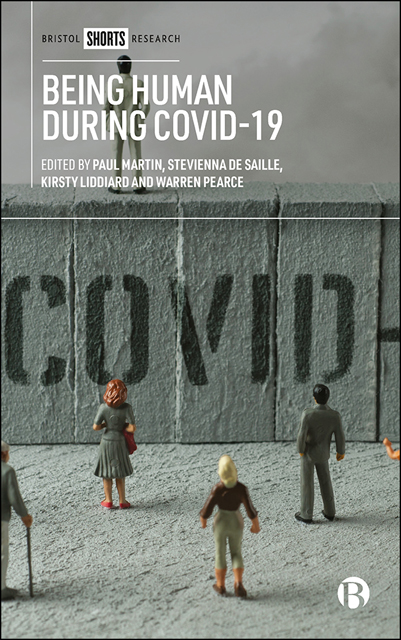Introduction
Published online by Cambridge University Press: 13 October 2022
Summary
This book centres on questions of the human that are raised by the pandemic which began in 2019 and addresses these through a series of short, accessible and thought-provoking essays that range across disciplinary boundaries and intellectual silos.
The COVID-19 crisis poses massive challenges for many citizens, businesses, policymakers and professionals around the globe. The pandemic has highlighted the deep divisions and inequalities that already existed, while at the same time opening up new fissures and fractures in society. However, as many have commented, the crisis also presents new opportunities to fundamentally rethink many aspects of social, cultural, psychological and economic life. Three key issues have emerged in this context that are fundamentally concerned with the experience, meaning and understanding of being human. Firstly, the marginalization of many groups of people, most notably members of Black, Asian and minority ethnic (BAME) communities, disabled, young, older and displaced people and how they are de/valued in the response to the virus. It is vital that their experiences are included when thinking about life after COVID-19. This collection pays special attention to the experience of disabled people, a group often neglected in many discussions of the pandemic. Secondly, the role of new scientific knowledge and other forms of expertise in these processes of inclusion and exclusion. Little critical attention has so far been paid to the central role of science in shaping our understanding and experience of the pandemic. Thirdly, the remaking and reordering of society as a result of the pandemic and the opening up of new futures for work, the environment, culture and daily life. At the same time, the relevance and applicability of human and social sciences have been debated as we enter a period of knowledge generation that has emphasized the biomedical over the socio-political or psycho-political. These critical understandings of how we might better make the future are still missing from public discussion of the post-COVID-19 world.
The focus on ‘the human’ as a central analytical heuristic is a defining feature of the approach taken here. This owes much to ideas coming out of the broader field of what has become known as the critical posthumanities.
- Type
- Chapter
- Information
- Being Human during COVID-19 , pp. 1 - 10Publisher: Bristol University PressPrint publication year: 2022

